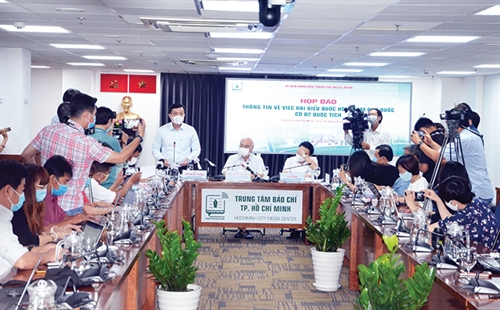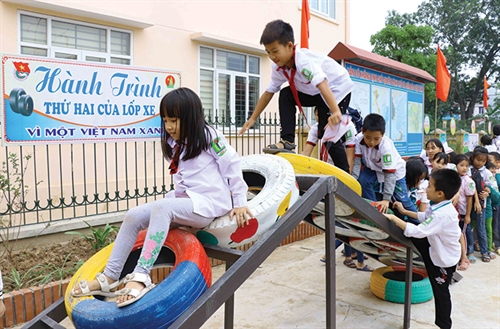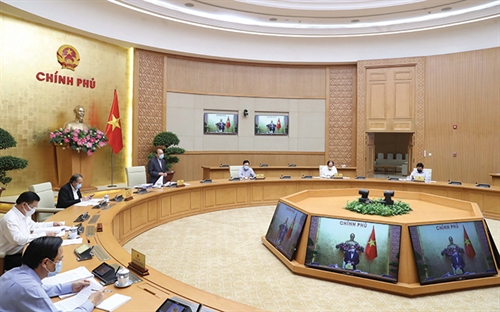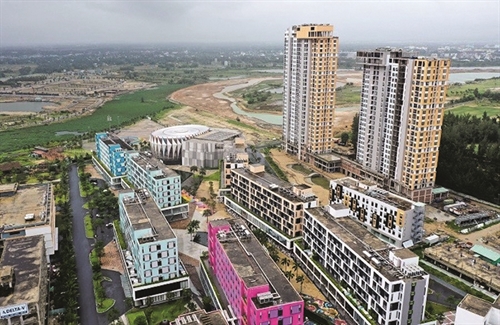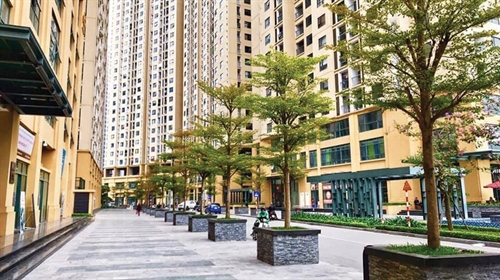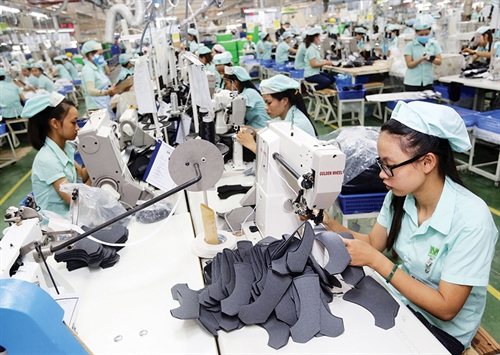The Central Vietnam is undergoing tough times when severe storms have led to landslides and flash floods causing enormous damage to the lives, health and assets of people. Many local and international organizations and individuals have joined relief efforts and handed over huge donations to help the victims.
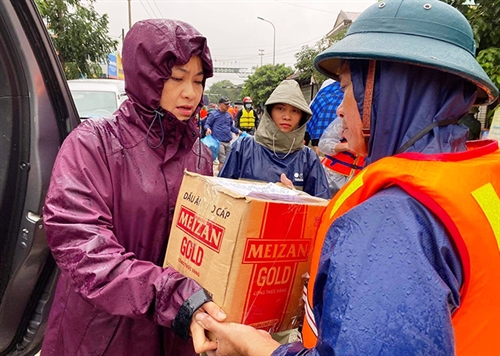 |
| Relief goods are distributed to flood victims in Central Vietnam__Photo: Vo Dung/VNA |
In mid-October, pop singer Thuy Tien, via her Facebook account, called for donations for flood and landslide victims in the Central Vietnam. On October 20, she announced the money amount raised after a week has exceeded VND 100 billion (approximately USD 4.4 million).
Singer Thuy Tien is among many individuals, both celebrities and normal people, who are trying their best to render support to disaster victims alongside state agencies and professional charity organizations.
Bypassing controversies about how singer Thuy Tien and other individual fundraisers mobilize and spend money, there remains a question: Does the current law permit individuals to raise money for charity purposes?
Currently, the mobilization, receipt, distribution and use of voluntary contributions to help victims of natural disasters, fires and serious incidents and fatal disease patients are regulated under Decree 64 of 2008. Meanwhile, the operation of charity funds is governed by Decree 93 of 2019.
Under Article 5 of Decree 64, organizations and units entitled to receive and distribute aid include: (i) The Central Committee of the Vietnam Fatherland Front; Vietnam Red Cross Society; central and local mass media; local Vietnam Fatherland Front Committees and Red Cross Associations; licensed social funds and charity funds; central organizations and units allowed by the Central Committee of the Vietnam Fatherland Front and local organizations and units permitted by provincial- or district-level Vietnam Fatherland Front Committees.
Looking at the above regulations, it is easy to realize that individuals are not listed as entities allowed to receive and distribute aid for humanitarian purposes. However, “there is no law in either document [Decree 64 or Decree 93] prohibiting individuals from raising and receiving donations for charity,” lawyer Vu Quang Ba from AB & Partner Law Firm said in an interview with the Vietnam Lawyers Association magazine.
“In Decree 64, it is clearly stipulated that Vietnamese and foreigners are encouraged, honored and provided with favorable conditions to make and mobilize contributions to help people in need quickly overcome consequences of natural disasters or assist patients with serious illnesses, etc. Furthermore, preventing people from participating in humanitarian aid is considered one of prohibited acts,” Ba analyzed.
“Singer Thuy Tien does not violate any law,” President of the Vietnam Red Cross Society Nguyen Thi Xuan Thu affirmed in a recent talk with local media. “In the light of the civil law, she only acts as an intermediary who delivers goods and money to eligible recipients under the entrustment of the donors,” Thu explained.
In order to put an end to worthless debates and help kind-hearted people like Thuy Tien ease their minds and focus their efforts on relief activities, the Government Office has promptly released a document conveying Prime Minister Nguyen Xuan Phuc’s request for formulation of a new decree to replace Decree 64.
As instructed by the Government leader, the new decree should encourage and honor individuals and organizations to promote the national solidarity and help people overcome difficulties resulted from natural disasters, fires, and serious incidents as well as to help patients suffering fatal diseases soon resume their livelihood.
The cabinet head also requires local administrations to coordinate closely with Fatherland Front Committees, Red Cross Associations and other relevant units to instruct and support individuals and organizations to carry out relief activities.
Commenting on the intention to revise current regulations on mobilization, receipt, distribution and use of voluntary contributions for charity purposes, lawyer Dang Van Cuong from the Hanoi Bar Association said: “This is a prompt and necessary move to remove any existing obstacles in charitable activities, help promote people’s patriotism, humanity, spirit of community and sympathy for their fellow countrymen, especially in times of distress.”
For the time being, the matter of concern for most legal experts is how to shape a legal framework that would, on the one hand, encourage people to make philanthropic giving and, on the other hand, ensure lawfulness, effectiveness and transparency of charitable operations.
Dr. Do Hanh Nga from the University of Social Sciences and Humanities under the Vietnam National University, Ho Chi Minh City, recommended four requirements on the to-be-issued decree. Firstly, the new regulation should create the most favorable conditions for all organizations and individuals to make contributions to support people in need through various channels, both official and unofficial. Secondly, it is necessary to create a mechanism to raise the quality of operations of mass organizations such as the Red Cross and Fatherland Front, especially those involving mobilization, receipt, distribution and use of voluntary contributions, so as to improve public confidence in and mobilize social resources for relief and charity activities through these organizations. Thirdly, the new rule must ensure convenient and effective coordination between administrations of localities where relief and charity activities take place and philanthropists. Finally, the voluntary contributions must be distributed and used for eligible beneficiaries and proper purposes.
According to Dr. Thai Thi Tuyet Dung, a lecturer of the Ho Chi Minh City University of Law, the new decree should divide philanthropic giving into relief activities in response to emergency circumstances and donations under normal conditions.
“For relief activities, the State should secure the safety for not only local inhabitants but also those who participate in rescue and relief operations in a spontaneous manner,” Dung suggested.
“Prompted by feelings of compassion, many people may enthusiastically join relief operations but if they do not have sufficient skills, tools, information and experiences to access and render support in disaster-stricken areas, accidents might occur and in that event, the burden on professional rescue forces will increase,” she wondered.
As for charitable activities under normal conditions, Dung said a mechanism is required to identify responsibilities of related parties so as to avoid risks and disputes that may arise from distribution of voluntary contributions.
“In many countries, money poured into accounts of individuals and organizations calling for charitable contributions is closely controlled while large donation amounts are usually distributed via capable legal persons such as charity funds and social funds,” Dung said.
Lawyer Cuong suggested increasing subjects entitled to mobilize, receive and distribute charitable donations to include also individuals, besides the entities mentioned in Article 5 of Decree 64. “This will ensure the lawfulness of charitable activities of individuals like those carried out by famous personalities in recent times,” Cuong was quoted by VOV.vn as saying.
“The new regulation should also be designed in a way that facilitates charitable activities and ensures relief goods are timely distributed to people in disaster-hit areas,” he said.
“Responsibilities of organizations and individuals engaged in mobilization and distribution of voluntary contributions must be clearly defined so as to have a legal basis for handling violations, especially acts of misappropriating relief goods and money,” Cuong stressed.
While agreeing with legal experts that the decree replacing Decree 64 should promote mobilization of social resources for relief activities in case of emergencies, Vice President of the Vietnam Red Cross Society Tran Quoc Hung hold on to the view that individuals calling for contributions should coordinate with organizations officially assigned by the State to conduct charitable operations.
“All people are encouraged to participate in humanitarian and charitable activities but it is better to assign state agencies and organizations to regulate, supervise, honor and commend typical examples in charitable giving,” he talked with Tuoi Tre online.
Hung suggested that state organizations may help philanthropists identify and certify people and households in disaster areas that are in need of emergency relief. “This will improve accountability and transparency of relief activities,” Hung said, adding that such help will not delay relief efforts but help realize them in a well-organized manner.- (VLLF)
